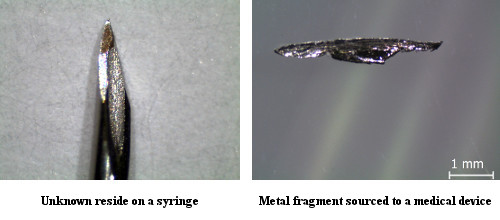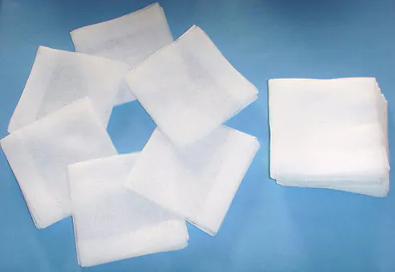Spotlight on: Medical Malpractice
Microtrace has worked with both plaintiffs and defendants to help resolve medical malpractice lawsuits. Our assistance usually involves the identification and sourcing of foreign materials in medical devices, or the identification of foreign material recovered from within patients. The latter has included surgical implants, surgical materials, non-licensed surgery, and other foreign matter. Such contaminants may include metallic particles, gauze, stitches, medical device parts, fibers, or other incongruous substances.
In addition to identifying foreign matter, there is often the need to associate a foreign object with a particular source or point of introduction. In many instances, it is possible to distinguish between materials made by different companies. Did the foreign matter enter from improper packaging of medical equipment, or was an instrument improperly handled by medical professionals? … Was the foreign material introduced to the patient during the most recent surgery or an earlier one? …or was it unintentionally or intentionally added by the patient?

Such questions can be difficult to answer. Due to the variety of materials and possibilities, there is rarely a “standardized” approach for answering such questions. It is generally necessary first to identify the materials involved and then use scientific logic to place constraints on the origin of a material. The extent to which such an analysis can be taken depends upon the sample and its condition. In some cases, specific details about relevant medical processes or the patient’s medical history may help to constrain further the point at which foreign matter was introduced. Assisted by our vast experience with a wide-range of materials, our identification and sourcing of foreign matter can help to establish liability.
Recognizing the inherent deficiencies of “standardized” processes in these instances, Microtrace scientists pride ourselves on our ability to adapt our approach to address the unique questions arising from each particular case. While maintaining this flexibility, which is central to our philosophy, we adhere to the same ISO 17025 quality standard to which forensic laboratories around the world are accredited. Consequently, our approach to foreign material location, characterization, identification, and sourcing has allowed us to establish an international reputation as a reliable and trusted source for impartial and scientifically-supported solutions to medical malpractice issues, which stand up to both the scientific and legal scrutiny of expert testimony.
Expert Testimony
A large percentage of the analyses conducted at Microtrace involve, or have the potential to involve, criminal or civil litigation. As such, all casework conducted at our laboratory is rigorously supported by scientific results intended to withstand the scrutiny of peer review and litigation. While remaining technically robust, Microtrace scientists take great pride in providing results in a context that not only addresses the specific and pertinent questions of a particular case, but do so in a manner that can be understood by a non-technical observer.
When cases go to deposition or trial, our staff is able to rely upon their extensive training, research, publications, and years of specialized scientific experience that span numerous disciplines and a wide range of micro-analytical methods, to support our findings. The courtroom experience of our staff spans civil, criminal, and military trials in state, federal, and international jurisdictions.
The materials examined in our laboratory, as well as the analytical methods used to study them, require highly specialized knowledge and experience. As such, the appropriate interpretation of the generated technical data often hinges on the recognition of subtle nuances that can easily be overlooked by those unfamiliar with this subject matter. With this in mind, we provide assistance in the form of technical reviews of the reports and results of opposing experts, and can assist with the formulation of cross-examination questions.
How May We Help You?
Contact usto discuss your project in more detail.








